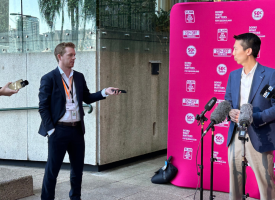Get children out of detention centres
AMA Position Statement on the Health Care of Asylum Seekers and Refugees
The AMA today released its revised Position Statement on the Health Care of Asylum Seekers, which was last updated in 2011.
AMA President, Professor Brian Owler, said that the Position Statement reaffirms the AMA’s long-held view that all asylum seeker children should be moved out of immigration detention to healthier and more humane environments within the community.
According to the latest Immigration Detention and Community Statistics Summary, as at 30 November 2015, there were104 children held in immigration detention facilities within the Australian mainland, 70 children held in detention in Nauru, and 331 children in community detention.
“The AMA again calls on the Government to release children from detention as early as possible,” Professor Owler said.
“We acknowledge that the Government has significantly reduced the numbers of children in detention, but it is time for all the detained children to be moved to safer places.
“Detention has severe adverse effects on the health of all asylum seekers, but the harms in children are more serious.
“Some of the children have spent half their lives in detention, which is inhumane and totally unacceptable.
“These children are suffering extreme physical and mental health issues, including severe anxiety and depression.
“Many of these conditions will stay with them throughout their lives.
“The AMA urges the Government to establish a national statutory body of clinical experts, independent of the Government, to investigate and advise on the health and welfare of asylum seekers and refugees, and report their findings to the Parliament.
“This would ensure honesty and transparency in how Australia protects the health and wellbeing of vulnerable people, especially children, in our care.”
Professor Owler said that doctors have an ethical and moral obligation to act in the best interests of their patients and speak out about concerns in regards to the welfare of their patients, whether it be the treatment of an individual or whether it be at a system level.
“Legislation, such as the Australian Border Force (ABF) Act, should not impact on a doctor’s ability to treat a patient or speak out about unjust maltreatment.”
“The biggest concern of the ABF Act, with the secrecy provisions, is the possibility of doctors and whistle-blowers possibly facing two years in jail for leaking information in regards to offshore detention facilities.
“Doctors have an ethical obligation to treat asylum seekers and refugees in need.”
The Position Statement restates the AMA position that those who are seeking, or who have been granted, asylum within Australia have the right to receive appropriate medical care without discrimination, regardless of citizenship, visa status, or ability to pay.
“All asylum seekers and refugees, regardless of their citizenship or visa status, should have universal access to basic health care, counseling and educational and training opportunities,” Professor Owler said.
“Refugees and asylum seekers living in the community should have access to Medicare and the Pharmaceutical Benefits Scheme, state welfare and employment support, and appropriate settlement services.”
Other key recommendations of the Position Statement include:
- In order that asylum seekers do not spend a prolonged, indeterminate period of time in detention, the Government must set in law an absolute maximum duration that an asylum seeker can spend in detention.
- Where immigration detention centres continue to be used to detain asylum seekers, the Government must provide basic humane standards of living conditions. They must strive to achieve world's best practice in all Australian detention centres, whether located within Australia or offshore. This includes accommodating the health, linguistic, cultural, social, educational, privacy, gender-specific, and religious needs of asylum seekers.
- Those in detention should have access to appropriate specialist services including sexual and reproductive health, obstetric and gynaecological services, antenatal and postnatal care, paediatric services, mental health, rehabilitation, allied health services, and dental services.
- Individuals who are released into the community must have timely access to their medical records from their time in detention. Those who are deported should receive a copy of their medical record from their time in detention to take with them.
- Temporary Visas have negative impacts on asylum seekers’ mental health as these visas impose undue stress and anxiety on individuals because they cannot apply for permanent visas and are unable to travel in and out of Australia, or access family reunion schemes. Temporary Visas undermine the ability to successfully integrate into the community.
- All asylum seekers and refugees should be afforded access to support services, settlement services, employment services, and entitlement to family reunion. Failure to access these services has significant negative health consequences.
- Asylum seekers should not be transferred from one detention facility to another without notice. This can exacerbate their physical and psychological conditions, and denies them continuity of care.
- Doctors treating asylum seekers who are transferred should be able to provide appropriate handover of relevant documents.
- Asylum seekers with disabilities are at a particular risk and should receive the same equitable access to appropriate support and health services.
- Pregnant women held in detention facilities are at a particularly high risk of deteriorating mental and physical health, and should receive adequate support services with appropriate pre- and post-natal care.
- Pregnant women should have access to appropriate obstetric and neonatal services for the safety of delivery.
- Unaccompanied children should never be placed in detention facilities.
- Children and their families should be accommodated in separate, safe, and appropriate living areas.
- Families should be prioritised for processing, as separation of family members can exacerbate physical and mental conditions.
The AMA Position Statement on the Health Care of Asylum Seekers and Refugees is at https://ama.com.au/position-statement/health-care-asylum-seekers-and-refugees-2011-revised-2015
23 December 2015
CONTACT: John Flannery 02 6270 5477 / 0419 494 761
Kirsty Waterford 02 6270 5464 / 0427 209 753
Follow the AMA Media on Twitter: http://twitter.com/ama_media
Follow the AMA President on Twitter: http://twitter.com/amapresident
Follow Australian Medicine on Twitter: https://twitter.com/amaausmed
Like the AMA on Facebook https://www.facebook.com/AustralianMedicalAssociation



